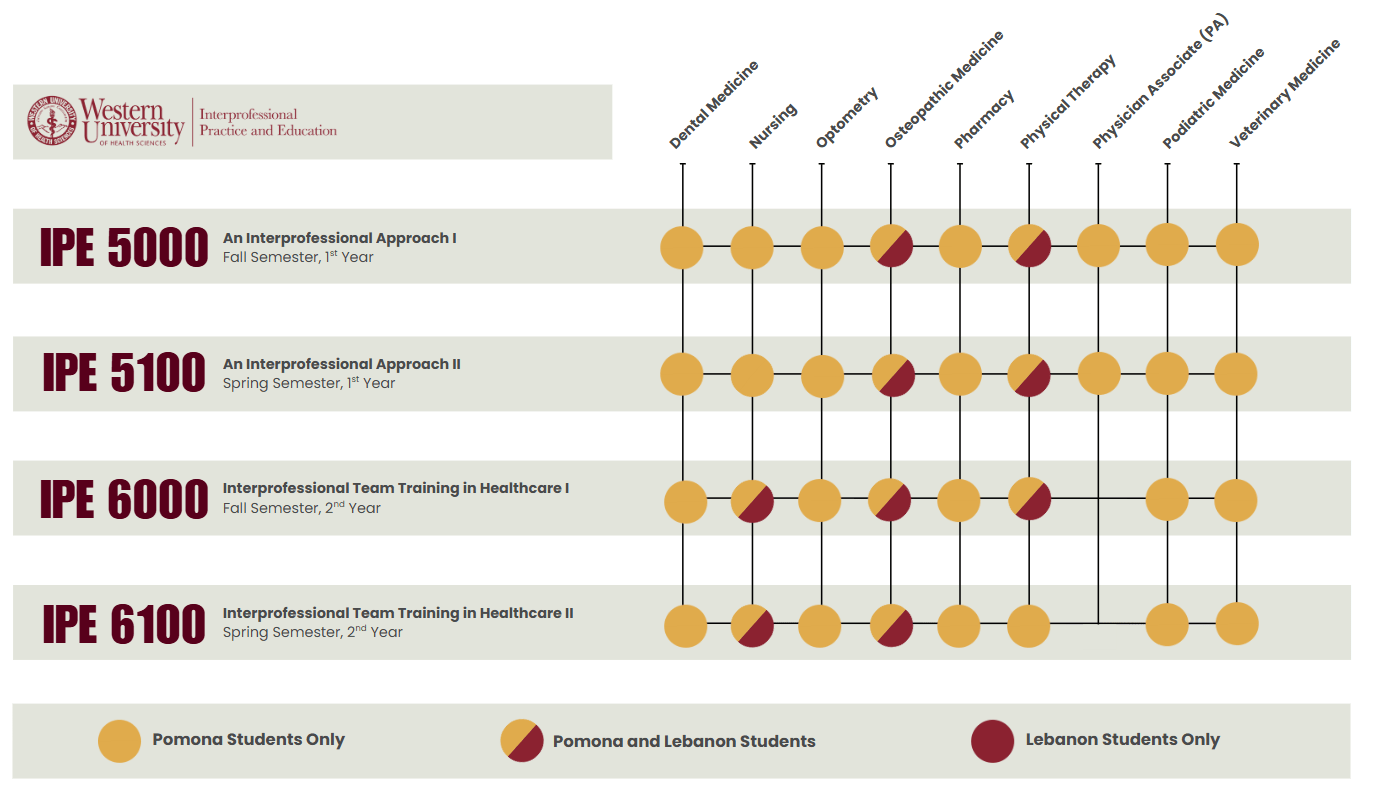
Curriculum
IPE Course Descriptions
IPE 5000: An Interprofessional Approach I (1.0 credit hour, CR/NCR). This course is a required university seminar for all first-year health professional students. This course will introduce professions across various fields with content related to roles, responsibilities, team, teamwork, communication, values and ethics. Introductory level content related to cultural humility, social determinants of health, and health systems will be explored. Activities in this course may include exposure level asynchronous lectures, interactive health professions program exposure, and in-person group/team experiences. Experiences will integrate elements common to all professionals such as ethical, behavioral, social, and psychological. This course is a graduation requirement for all health professional programs with attendance required. Absences may be excused but this does not exclude students from the responsibilities associated with the course and required for its completion.
IPE 5100: An Interprofessional Approach II (1.0 credit hour, CR/NCR). This course is a required university seminar for all first-year health professional students. Working in interprofessional teams, this course builds upon the knowledge and experience gained in the IPE 5000 course. Activities in this course may include asynchronous lectures, clinical scenario role-playing, synchronous discussion sessions, in-person/group team experiences, and health events. Experiences will integrate elements common to all professionals such as ethical, behavioral, social, and psychological with increasing levels of complexity. This course is a graduation requirement for all health professional programs with attendance required. Absences may be excused but this does not exclude students from the responsibilities associated with the course and required for its completion.
IPE 6000: Interprofessional Team Training in Health Care I (1.0 credit hour, CR/NCR). IPE 6000 will continue to build upon the knowledge from the IPE 5000 series but will elevate learning activities deeper in the immersion phase expanding upon knowledge gained in previous IPE courses with additional community health event planning experiences to apply advanced tools and strategies that are crucial in working as a collaborative healthcare team. Activities in this course include immersion phase level activities such asynchronous recorded lectures, mock patient experiences, synchronous discussion sessions, in-person/group team experiences related to health systems, patient advocacy, health event planning, and/or interprofessional research exposure. This course is a graduation requirement for all health professional programs with attendance required. Absences may be excused but this does not exclude students from the responsibilities associated with the course and required for its completion.
IPE 6100: Interprofessional Team Training in Health Care II (1.0 credit hour, CR/NCR). This course continues to build on experiences in IPE 6000. In a culminating semester for the foundational IPE course series, students will deepen their knowledge gained in prior IPE courses and the current IPE 6100 entry-level content via asynchronous lecture and through activities that can include health event planning, community health learning event, team/group in-person experiences related to health systems, patient advocacy, and/or interprofessional research exposure. This course is a graduation requirement for all health professional programs with attendance required. Absences may be excused but this does not exclude students from the responsibilities associated with the course and required for its completion.

The following topics are integrated within each of the courses above.
Health Systems Science (HSS)
The study of how health care is delivered, how health care professionals work together to deliver that care, and how the health system can improve patient care and health care delivery. Along with basic and clinical sciences, HSS is rapidly becoming a crucial “third pillar” of health professions science, with an emphasis on understanding the role of human factors, systems thinking, leadership, and health systems improvement strategies.
Humanism, Diversity, Equity, Inclusion, Anti-Racism, and Anti-Bias
Often throughout the IPE Program a topic is put under one or more of these conceptual lenses during small- or large-group discussion. To provide insights into these topics we have, at various points, worked with members of the following organizations:
- Black Student Union
- Chinese American Health Students Association
- Hawaiian Islands Cultural Club & Filipino American Students Association
- Latino Medical Student Association
- LGBTQ Equality Alliance
- Native American Health Career Ladder
- Student National Dental Association
- Student National Medical Association
- White Coats for Black Lives
The IPE department regularly solicits student feedback and tracks knowledge acquisition both during and at the conclusion of each IPE course for the purpose of assessing curriculum effectiveness and improving IPE curriculum content and delivery. Student feedback is carefully considered together with input from the IPE Design and Implementation teams when making curricular improvements.

